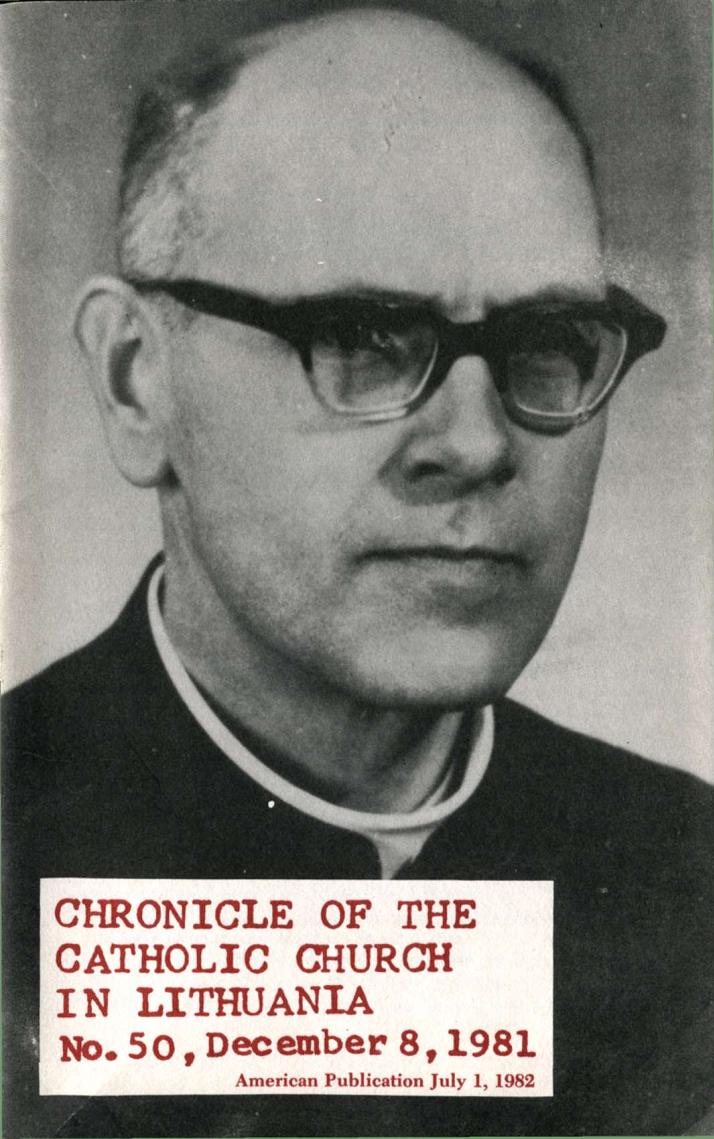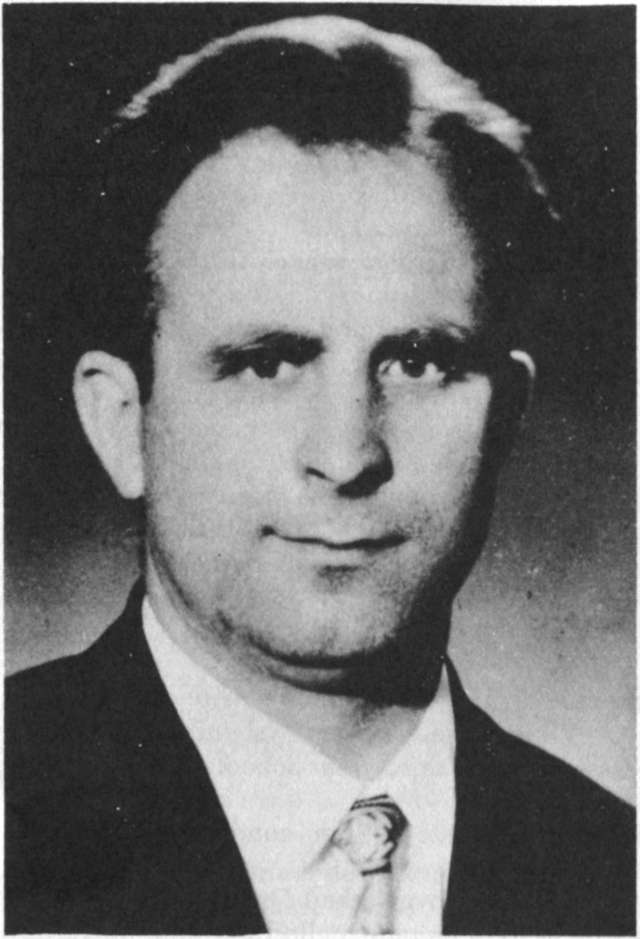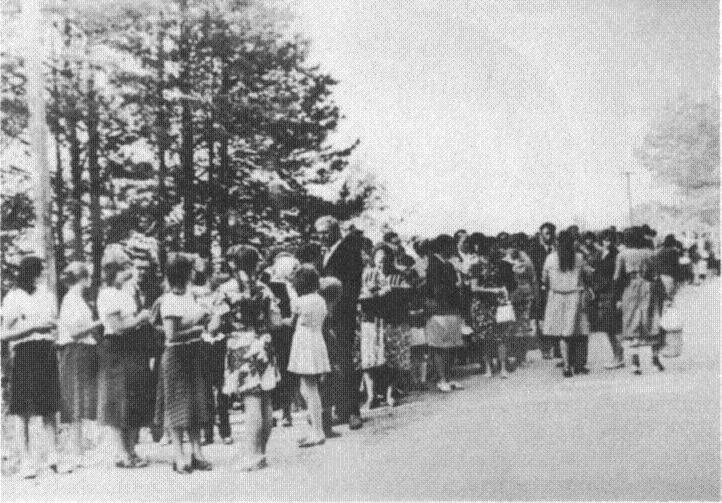
This issue is dedicated to the late Father Bronius Laurinavičius, a good soldier of Christ and Lithuanian Helsinki Group member who gave his life and his death for the future of the Church and Homeland.
THE CHRONICLE OF THE CATHOLIC CHURCH IN LITHUANIA No. 50
In this Issue:
1. A Brief Review of Events October through December 1981
2. The Death and Funeral of Father Bronius Laurinavičius
3. The KGB Intimidates Young People
5. Thank you for your Sacrifice!
6. Why Does Šiluva Terrify the Atheist Authorities?
Lithuania....................................... December 8, 1981
Moscow "consented" this year to reinstate Bishop Julijonas Steponavičius of the Archdiocese of Vilnius and Bishop Vincentas Sladkevičius of the Diocese of Kaišiadorys, held in exile for over twenty years without a trial. Foreign diplomats often trust Moscow's good will, but in Lithuania, where believers endure daily the deceit and hypocrisy of state atheism, every gesture of "good will" from the Soviet government arouses concern. In this instance, the concern was aroused by special circumstances.
Moscow demanded, as a condition to reinstating the exiled bishops, that three new candidates, handpicked by the Soviet authorities, be consecrated bishops: candidates chosen not by Church authorities but by the Soviet government and submitted to the Holy See. It remained only to convince the Holy See that the new candidates were suitable for the posts and that the plan to reinstate the exiled bishops and appoint new bishops was a positive step and would be beneficial to the Catholic Church in Lithuania. Collaborators with the KGB performed this task well and in July, following the Eucharistic Congress in Lourdes, it became apparent that the Soviet government had nearly attained its goal: the candidates they selected for bishops had been or in the very near future would be named bishops by the Holy See. This news was perhaps the most distressing to reach the Catholics of Lithuania throughout the entire postwar period. The Catholic Church in Lithuania had experienced every possible persecution during the postwar years: bishops were imprisoned and even shot, hundreds of priests travelled the roads of the Gulag, the Soviet press slung mud at priests and the Church, the Soviet government's administrative machine quashed any religious activity as if with pincers, however, the Church did not perish but proved quite viable.
On November 25, 1981, the news spread throughout Lithuania: Father Bronius Laurinavičius had met a tragic death. It was hard to believe because sad rumors often circulate throughout Lithuania or are even deliberately spread that someone has been arrested, someone has been killed, beaten, and some of these rumors do not prove accurate. But this time it did prove accurate .
At around 8:20 P.M. on November 25, 1981, near the intersection of Dzerzhinski and Žalgiris Streets in Vilnius, a Maz-503 truck, driven by Lazutkin, mortally injured the Pastor of Adutiškis and member of the Lithuanian Helsinki Group, Father Bronius Laurinavičius.
Upon hearing of this tragic event, Lithuania's believers and priests unanimously stated that this was the KGB's handiwork! Several days earlier, Tiesa (The Truth) had printed an article by reporter Danguolė Repšienė against Father Bronius Laurinavičius, allegedly for contributing to the delinquency of minors.
The circumstances surrounding the death were very unclear. The Lithuanian SSR Ministry of Internal Affairs took the case of the priest's death from the Vilnius Motor Vehicles Department and handed it to Inspector Vaitiekūnas.
Vilnius
In August, 1981, a campaign was launched to collect signatures under a complaint to the Lithuanian SSR Prosecutor General regarding the unlawful arrest of young people at the Molėtai Lake in the Village of Mindūnai (See Chronicle, No. 49), intimidation and unlawful actions by the militia and security police. Some 600 believers signed the protest. Although several months have elapsed since the incident and despite the believers' protest, young people continue to be intimidated on a regular basis.
On September 22, 1981, (Mrs.) Dagienė, manager of the Naujininkai store ordered head salesclerk Valda Ryliškytė who spent her summer vacation with other young people at the Molėtai Lake to go to the City of Vilnius Department of Trade. There, Valda found department head (Mrs.) Stelingienė and another woman waiting for her. They asked Valda when she began to believe and pray and voiced their amazement and ridicule that she, an 18-year-old girl, still believes in God and attends Church when all the newspapers and textbooks write that God does not exist. . . They threatened to expel her from the Communist Youth League which she had been forced to join while attending trade school.
In his letter of September 10, 1981, Petras Paulaitis writes: "Most of us (eleven Lithuanians) are doing tolerably well as far as our health is concerned. Naturally, all have suffered much, are exhausted and worried. I believe that our parents and grandparents would not have had cause to lament over them, and I also think our children — the future generation replacing us — will not

Vytautas Vaičiūnas
have cause to do so either. For these ordinary simple people, mostly from our countryside — now prisoners and martyrs for our country's freedom have returned all that has been invested in them, with good measure. Only God grant endurance!
"On October 10th of this year I will commemorate thirty-four years already suffered for our beloved homeland. With the help of the Almighty, I hope and wish during the remaining thirteen months to reach the shores of freedom and to see you once more . . . They don't give me many of the letters which arrive.
"My respects to all Brothers and Sisters of good will."
On October 17, 1981, Ona Vitkauskaitė completed her term at the Panevėžys women's labor camp. She had been arrested one and a half years earlier for duplicating the Chronicle of the Catholic Church in Lithuania.
On July 1, 1981, during a review of her record, the commission, consisting of camp administrative staff and several prisoners, summoning Ona Vitkauskaitė once again, used the customary lies and slander (one of the administrators accused Onutė of belonging to some kind of sect which corrupts children), conducted a "re-education" session for the purpose of obtaining from the prisoner a confession that she had "erred' and a promise to "mend her ways." When they heard no words of remorse but only the firm conviction: "in order to mend my ways from your so-called 'error', I must renounce my Faith, and I will never do that", the head of operations stated she would note in her file that she "does not stand on the road to improvement" and threatened that, with such an attitude, she would soon return.
As the end of her term approached, the administration, on the pretext that "the prisoners are many, while the days are few," refused to grant the private visit to which Vitkauskaitė was entitled, and shortened her general visit to the point that she barely had time to greet her visiting brother and exchange a few words, with him, although the main roll call was still several hours away.
During the last meeting on September 25th, the head of operations told Ona Vitkauskaitė, within the hearing of her family, that she would be released on October 17th, not before 9:00 or 9:30 A.M. The prisoner asked her family to bring her clothes at the time stated.
On September 12, 1981, four young men came to Šiluva from Estonia to pray: Ants Tomson, Tanne Kelam, Tonis Arro and Run-no Vissak.

Pilgrims gather for procession to Šiluva, 1977.
The militia detained them at the church and interrogated them. One of them, student Runno Vissak was expelled from Tartu University merely for going to Šiluva.
On October 25, 1981, 17-year-old Kęstutis Variakojis (from Panevėžys), a student of land drainage in trade school, came to Raseiniai intending to go to Šiluva and pray in the church there. Since an announcement was posted in the Raseiniai bus station that buses would not run to Šiluva on Friday, Saturday or Sunday (October 23, 24 and 25), the teenager decided to continue his journey on foot. Militia vehicles closely patrolled the road; he therefore took paths through the woods. When he re-emerged on the main road near Šiluva, a militia vehicle immediately pulled up, several militiamen jumped out and sternly ordered him to get in their vehicle for an "investigation."
As government atheists step up their methodical denigration and destruction of religion, the young believers of Lithuania are expressing their loyalty and love for Christ's Cross even more zealously. The youth of Lithuania is well aware of the source of the nation's strength and guarantee of survival and courageously states with the poet Brazdžionis:
"Existing only in the glow of future days,
You learned to live, my enslaved homeland,
For as all great heroes, you have found
Like a miracle, the source of the Lord."
During the night of September 25 to 26, 1981, young people erected a beautiful cross on the Vištytis-Kybartai road. At around 10:00 A.M. on the morning of the 26th, District Chairman Sarskas and Romas Žukauskas tore down the cross, but during the evening of the 27th that same cross rose up on the same spot, but stood a mere two hours because evil hands again tore it down. The people adorned the fallen cross with flowers, but this displeased the godless, and on October 18 they cut it into pieces and carted it awav.
On September 27, 1981, a cross appeared near the Vilkaviškis-Žalioji road. At the initiative of rayon religious deputy Urbonas, the cross was cut down on October 6th and carted away. For a long time fresh flowers brought by local residents appeared at the site of the desecrated cross.
Vilkaviškis
To: The Apostolic Administrator of the Archdiocese of
Kaunas and the Diocese of Vilkaviškis. A Petition from: The Priests of the Diocese of Vilkaviškis.
Lithuania's Ordinaries have proclaimed 1981 to be a Eucharistic Year in Lithuania. A half year has already passed, but there is very little indication that this year is truly Eucharistic. The desire of most priests and believers to attend the Lourdes Eucharistic Congress has received no response. Therefore, we strongly urge that a Eucharistic Congress be organized in Lithuania. Devotions in Šiluva on the feast of the Birth of the Virgin Mary would be the ideal time, especially on September 12th and 13th.
July 5, 1981
N.B. The statement was signed by many priests of the Diocese of Vilkaviškis; however, no attempt was even made to organize the Congress, out of fear of antagonizing the Soviet government.
Skaudvilė (Rayon of Tauragė)
To: First Secretary Griškevičius of the Lithuanian Communist Party
A Protest from: Father Vincas Vėlavičius, residing in Skaudvilė, Tauragės g. 17.
In the middle of February of this year and on March 2nd, two atheist programs were held at the Skaudvilė Middle School, which upper grade believing students were forced to participate. The Faith was vilely ridiculed in sketches, songs and poems.
For example: The grade 9B teacher put together a sketch mocking the Holy Sacrifice of the Mass. In the sketch, a schoolgirl, wearing a raincoat with crosses on her shoulders and chest, ridiculed the Holy Mass, beginning with the entrance hymn Pulkim ant kelių (Let's Fall to Our Knees), sprinkling with holy water, the Offertory, Consecration and Holy Communion of the Mass. The sketch used a vessel, similar to a chalice, full of candy and imitated the distribution of Holy Communion.
On March 12th of this year, correspondent Bernardas Šaknys raised a voice of protest in Tiesa (The Truth) against a physics teacher at the Lyduvėnai Middle School who imposed a strange punishment on a student who had not studied the lesson. He permitted other students to place a bag on the delinquent student's head and then the teacher himself and other students beat him.
1. Aušra (The Dawn), No. 28 (68). The issue contains the following articles: "Kuriuo keliu" (Žvilgsnis į Lietuvos dvasininkiją), (Along What Road) A Look at the Clergy of Lithuania), "Mūsų kultūros rūpesčiai" (Concerns of our Culture), "Lietuviai ir rusai" (Lithuanians and Russians), "Literatūrų "Lygiateisiškumas" Tarybų Sajungoje" (" 'Equal Rights' of Literatures in the Soviet Union"), etc. The issue appeared in September.
2. Tiesos kelias (Way of Truth),, No. 20. The issue appeared in December. One of the more meaningful articles: "Kunigas sakykloje" (The Priest in the Pulpit).
3. Dievas ir Tėvynė (God and Country), No. 19. The publication appeared at the end of the summer. It touches on Lithuania's Christian culture, the russification of Lithuanians and other current questions.
4. Rūpintojėlis (Suffering Christ), No. 17. Date of publication: July 17, 1981. The publication is dedicated to the Eucharistic Year. It contains many of Jadvyga Stanelytė's letters, a request to the Holy Father to beatify Archbishop Jurgis Matulevičius as soon as possible, etc.
Addendum to Issue No. 49 of the Chronicle of the Catholic Church in Lithuania:
Religious article vendors at the Portiuncula Indulgences in Telšiai were chased from the churchyard by finance inspector Vandzinskas.





